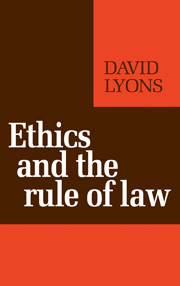Summary
Is law just a matter of social fact? Or does it have some essential contact with morality? In this chapter we shall consider ways in which law may be thought to have a moral dimension.
There seems little doubt that law interacts with moral opinions. Laws governing sexual conduct, the use of narcotic substances, property, contracts, and a host of other matters have been motivated, to some degree at least, by ideas about moral rights and responsibilities. Law is shaped by the values that people have – the values of those who are able to affect the development of law. The law also has an impact on moral attitudes; its enforcement, for example, tends to reinforce the values it reflects.
Some of the connections between law and moral ideas may be systematic. All systems of social organization seem to have some prohibitions on the use of force against individuals. It has been argued that social systems cannot survive unless they incorporate some protections for persons, property, and promises. But these restrictions are quite variable, and some favored groups within a society may enjoy protections that are not enjoyed by all. So, while law may reflect prevailing moral opinion, its restrictions do not necessarily correspond to sound moral principles.
But it may be possible for sound moral standards (if there are any) to become part of the law. The Fifth Amendment to the United States Constitution says that “No person shall be … deprived of life, liberty, or property, without due process of law.”
- Type
- Chapter
- Information
- Ethics and the Rule of Law , pp. 61 - 109Publisher: Cambridge University PressPrint publication year: 1983



